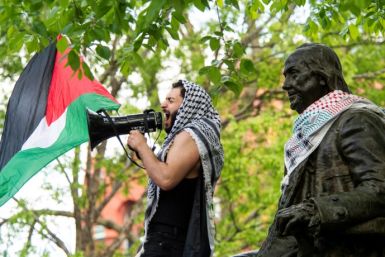Congolese Militia Smuggle $500 Million In Gold A Year: Report
M23 militants in eastern Congo have infiltrated several lucrative gold mines in order to bankroll their rebellion by smuggling out nearly $500 million of the precious metal a year, claimed a Washington-based human rights group on Thursday, accusing four African gold exporters for enabling the militia group, which has had a history of human rights violations.
The Enough Project, which aims to end genocide and crimes against humanity, said that the M23 rebel group were continued to trade in conflict gold, despite its leader Bosco Ntaganda's surrender to war crimes investigators in The Hague this year.
Current M23 commander Sultani Makenga "and his former co-commander Bosco Ntaganda have led the M23 rebels to work with local armed groups in gold-rich territories to smuggle gold to Uganda via an M23-controlled border crossing, as well as to Burundi, where it is sold internationally," the report said.
"Much of this conflict gold then reaches markets in the United Arab Emirates before going on to banks and jewellers, which together make up 80 percent of global gold demand."
"Gold is now the most important conflict mineral in eastern Congo, with at least 12 tons worth roughly $500 million smuggled out of the east every year.
"The other main sources of revenue for armed groups-the "3T minerals" of tin, tungsten, and tantalum-have been steadily reduced due to global conflict-minerals reforms spurred by the U.S. Dodd-Frank financial regulation law, but it is still relatively easy to smuggle gold."
"Limiting gold smuggling from eastern Congo must therefore become a priority for the international community," the report added.
The Enough Project named four gold exporters for helping the M23 trade its illicit gold overseas. They were Rajendra "Raju" Kumar, who currently trades through Mineral Impex Uganda; Mutoka Ruganyira, who currently operates through Ntahangwa Mining in Burundi; Madadali Sultanali Pirani, who currently runs Silver Minerals in Uganda; and Evariste Shamamba, who currently runs Etablissement Namukaya in Congo.
"The international community has done very little to combat the sale of conflict gold effectively," said the Enough Project. "None of the above-mentioned individuals, or the companies they currently run, face U.N., U.S., or E.U. sanctions."
"The only international sanctions against conflict gold companies were enacted in 2007, but the owners of the sanctioned companies immediately set up new gold-exporting businesses under different corporate names," the Enough Project further noted.
"The fact that a significant part of conflict gold trade enters the formal worldwide gold trade shows an urgent need to levy targeted international sanctions on the individual exporters - the beneficial owners of these businesses - who are complicit," they recommended.
M23 formally launched its rebellion last year, drawing its name from a failed March 23, 2009 peace agreement with the Congolese government. Many of the M23 rebels were previously members of an earlier rebel group that also was involved in gold trafficking.
M23 now has more than 1,500 troops, including alliances with several Congolese armed groups, and their fighting has displaced hundreds of thousands of people. According to the Un, M23 is being backed by Rwanda and to a lesser extent by Uganda, with heavy weaponry, troops, and recruits.
In an interview with the Associated Press, Vianney Kazarama, a spokesman for the M23 rebels "categorically denied" the Enough Project's findings.
"Our leader Sultani Makenga has never trafficked minerals from the time he was in the army until now," Kazarama said.
Among past accusations leveled against the group include raping and killing civilians, as well as recruiting child soldiers.
Rupert Colville, a Geneva-based spokesperson for the UN High Commission for Human Rights,warned last year that the M23 may re-spark a crisis in the Democratic Republic of the Congo, especially with a senior command that has "substantial allegations of atrocities" against it.
The M23 "is really a reassembling - at least at the leadership level - of very well-known human rights abusers in the Congo over the past decade... quite a collection of notorious killers," said Colville.
"Everyone is worried about M23 because of its leaders and their involvement in killings in the past - and that there is no access to these areas [controlled by M23] at the moment," added Thierry Vircoulon, International Crisis Group project director for Central Africa to IRIN News.
Economy Watch






